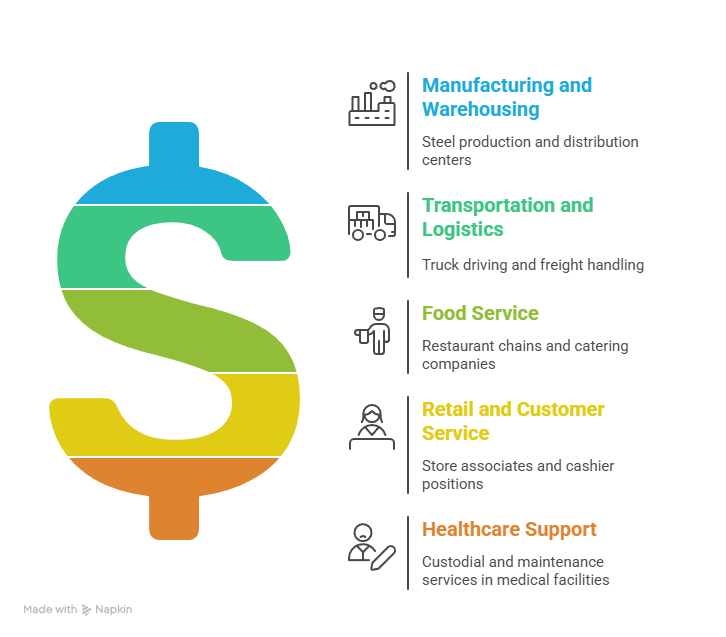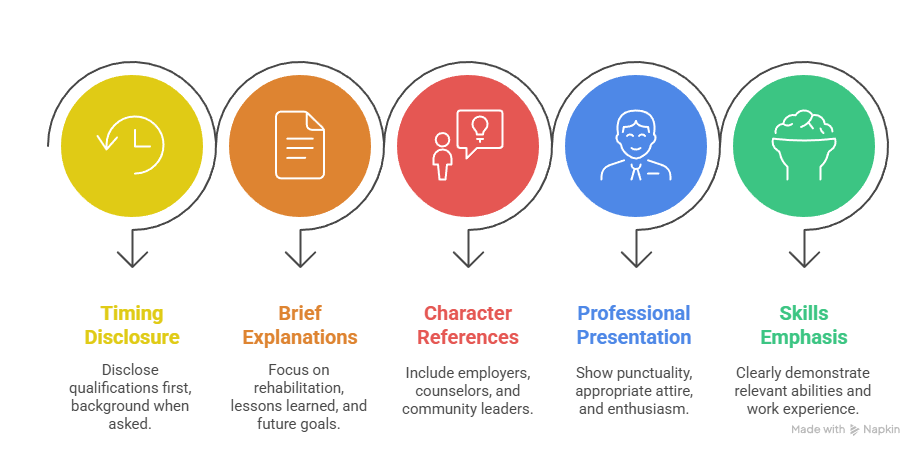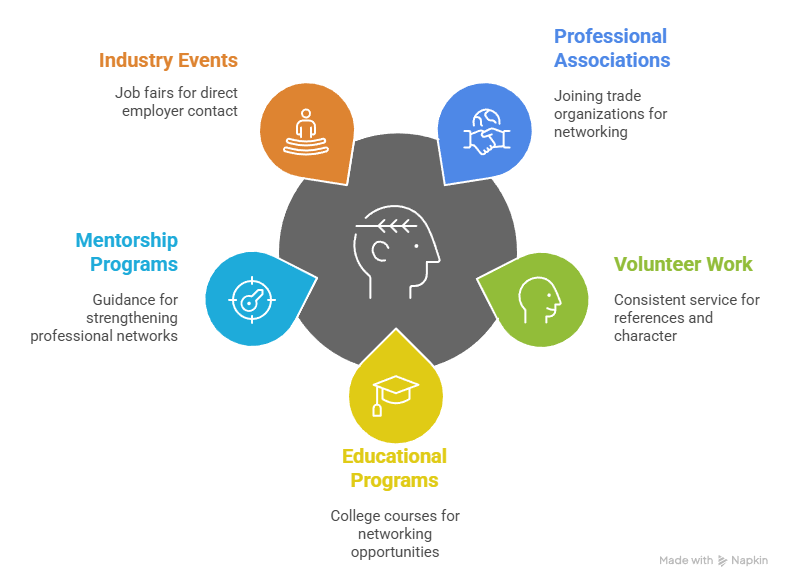Pennsylvania's second chance employment laws and "Ban the Box" initiatives provide significant opportunities for individuals with criminal records seeking meaningful careers. The state's diverse economy, from manufacturing to healthcare, offers multiple pathways to stable employment for those committed to rebuilding their professional lives.
Key Takeaways
- Pennsylvania follows federal EEOC guidelines requiring employers to consider individual circumstances before rejecting applicants based on criminal history.
- The state prohibits public employers from asking about criminal history on initial job applications through "Ban the Box" legislation.
- Industries like construction, manufacturing, transportation, and food service actively hire individuals with felony records.
- Professional licensing restrictions vary by field, but many occupations remain accessible with proper documentation and rehabilitation evidence.
- Second chance programs, workforce development initiatives, and reentry services provide crucial support for job seekers with criminal backgrounds.
- Expungement and record sealing options can improve employment prospects for eligible individuals with past convictions.
Understanding Pennsylvania Employment Laws for Former Offenders
Pennsylvania maintains progressive employment policies that balance public safety with second chance opportunities. The Pennsylvania Human Relations Act prohibits discrimination based on criminal history unless directly related to job responsibilities. Moreover, state agencies cannot inquire about criminal records during initial application stages, following "Ban the Box" principles that allow candidates to demonstrate qualifications first.
Private employers face fewer restrictions but must follow federal Equal Employment Opportunity Commission guidelines. These regulations require individualized assessments considering conviction relevance, time elapsed, and rehabilitation evidence. Additionally, Pennsylvania's Clean Slate law automatically seals certain criminal records, expanding employment access for qualifying individuals.
The state's approach emphasizes rehabilitation over permanent punishment. Employers receive liability protections when hiring individuals with criminal records through established procedures. This framework encourages businesses to evaluate candidates holistically rather than making blanket exclusions based solely on past mistakes.
Industries and Sectors Actively Hiring Felons
Pennsylvania's construction industry offers excellent opportunities for individuals with criminal records. Union apprenticeship programs, including electrical, plumbing, and carpentry trades, focus primarily on work ethic and learning capacity. These positions provide competitive wages, comprehensive benefits, and clear advancement pathways without extensive background check requirements.

- Manufacturing and Warehousing: Steel production, food processing, Amazon, FedEx distribution centers
- Transportation and Logistics: Truck driving, delivery services, freight handling operations
- Food Service: Restaurant chains, catering companies, institutional food preparation
- Retail and Customer Service: Store associates, inventory management, cashier positions
- Healthcare Support: Custodial services, food service, maintenance in medical facilities
Manufacturing companies often partner with reentry organizations to identify committed workers. Similarly, transportation companies value reliability and safety training over pristine backgrounds. These industries consistently demonstrate flexibility in their hiring practices for motivated applicants.
Professional Licensing Considerations
Pennsylvania licensing boards evaluate criminal history on a case-by-case basis for most professions. Healthcare positions, including certified nursing assistant and medical technician roles, consider conviction relevance and rehabilitation evidence. Financial services careers face stricter federal restrictions, but many positions remain accessible depending on specific circumstances.
| Profession Category | Typical Requirements |
| Healthcare (CNA, EMT) | Individual review, rehabilitation evidence required |
| Skilled Trades | Minimal restrictions, focus on competency |
| Real Estate | State board assessment, character evaluation |
| Security Services | Federal restrictions, limited opportunities |
| Food Handler/Safety | Generally accessible with proper training |
The Pennsylvania Department of State provides guidance on licensing requirements for individuals with criminal records. Legal counsel specializing in occupational licensing can navigate complex requirements effectively for challenging cases.
Job Search Strategies and Resources
Nonprofit and Reentry Organizations
Pennsylvania hosts numerous organizations dedicated to supporting formerly incarcerated individuals in their job search efforts. The Pennsylvania Department of Corrections partners with local nonprofits to provide pre-release employment preparation and post-release job placement assistance. These organizations understand employer concerns and can effectively advocate for their clients.
Career Link offices throughout Pennsylvania provide free employment services including resume writing, interview preparation, and job matching. These state-funded programs don't discriminate based on criminal history. Furthermore, they offer specialized support for individuals facing employment barriers.
Online Job Platforms and Applications
Several job search platforms specifically cater to individuals with criminal backgrounds. Companies like Honest Jobs, 70 Million Jobs, and Second Chance focus exclusively on felon-friendly employers. These platforms screen participating companies to ensure genuine second chance opportunities rather than predatory schemes.
Traditional job boards like Indeed and ZipRecruiter also contain numerous opportunities, though applicants must research company policies carefully. Using keywords like "second chance," "background friendly," or "reentry" can help identify suitable positions. LinkedIn profiles emphasizing skills and rehabilitation demonstrate professional growth to potential employers.
Government Workforce Development Programs
Pennsylvania operates comprehensive workforce development programs through the Department of Labor and Industry. These programs offer vocational training, apprenticeships, and direct job placement services. Additionally, they provide support services like transportation assistance and childcare referrals to remove employment barriers.
- PA CareerLink: Free job search assistance, skills assessment, training programs
- Apprenticeship Programs: Paid training in high-demand trades and technical fields
- Adult Education: GED completion, basic literacy, English language learning
- Vocational Rehabilitation: Services for individuals with disabilities or barriers to employment
Most programs accept participants regardless of criminal background. They focus on developing marketable skills and connecting participants with employers committed to second chance hiring.
Application and Interview Best Practices
Honesty and preparation form the foundation of successful job applications for individuals with criminal records. Pennsylvania law requires disclosure of criminal history only when specifically asked and legally relevant to job duties. When disclosure becomes necessary, focus on personal growth, skills acquired, and commitment to positive change rather than dwelling on past mistakes.

- Timing Disclosure Strategically: Highlight qualifications first, address background when asked
- Brief Explanations: Focus on rehabilitation, lessons learned, future goals
- Character References: Include employers, counselors, community leaders as references
- Professional Presentation: Punctuality, appropriate attire, enthusiastic attitude
- Skills Emphasis: Demonstrate relevant abilities and work experience clearly
Preparing for common questions about criminal history builds confidence and ensures consistent messaging. Practice explaining gaps in employment history positively, emphasizing education, volunteer work, or skills development. Professional appearance and enthusiasm often outweigh concerns about past mistakes for understanding employers.
Building Professional Networks and References
Community connections provide valuable networking opportunities through support groups, workforce development programs, and faith-based organizations. Participating in community service projects demonstrates commitment to positive change while building relationships with potential references or employers. Many successful professionals with criminal backgrounds actively mentor others facing similar challenges.

- Professional Associations: Trade organizations welcome new members regardless of background
- Volunteer Work: Consistent service builds references and demonstrates character
- Educational Programs: College courses, vocational training create networking opportunities
- Mentorship Programs: Both receiving and providing guidance strengthens professional networks
- Industry Events: Job fairs, workshops, conferences provide direct employer contact
Strong references significantly impact hiring decisions for candidates with criminal records. Former employers who witnessed work ethic and reliability make excellent references, even for positions predating incarceration. Building references requires consistent demonstration of reliability and professionalism over time.
Legal Rights and Protections
Pennsylvania employment law provides several protections for individuals with criminal records during the hiring process. Employers cannot automatically disqualify applicants based solely on arrest records without convictions. When considering criminal history, employers must demonstrate a direct relationship between specific convictions and essential job functions rather than making blanket exclusions.
| Legal Protection | Description | Enforcement Agency |
| Individual Assessment Rights | Case-by-case evaluation required | PA Human Relations Commission |
| Ban the Box (Public) | No criminal history on initial applications | Department of General Services |
| EEOC Compliance | Federal guidelines for fair hiring practices | Equal Employment Opportunity Commission |
Legal aid organizations throughout Pennsylvania provide free consultation on employment discrimination issues. The Pennsylvania Human Relations Commission investigates complaints regarding unfair hiring practices based on criminal history. Understanding these protections empowers job seekers to pursue opportunities confidently while recognizing their rights.
Expungement and Record Sealing Options
Automatic Record Sealing Under Clean Slate
Pennsylvania's Clean Slate law automatically seals certain criminal records after specified waiting periods, significantly improving employment prospects. Misdemeanor convictions seal after ten years, while summary offenses seal after five years, assuming no subsequent convictions occur. This automatic process removes records from standard background checks used by most employers.
The Clean Slate system operates without requiring petitions or legal fees for eligible records. Records sealed under this law legally allow individuals to answer "no" when asked about criminal history for most employment purposes. However, certain positions involving vulnerable populations may still access sealed records.
Petition-Based Expungement Options
More serious felony convictions may qualify for petition-based expungement or sealing under specific circumstances. Factors include conviction type, sentence completion, rehabilitation evidence, and time elapsed since release. Successfully sealed or expunged records provide even stronger legal protections than automatic sealing provisions.
Legal assistance improves success rates for petition-based record relief significantly. Many nonprofit legal clinics offer free or low-cost expungement services for qualifying individuals. The investment in legal fees often pays dividends through expanded employment opportunities and increased earning potential.
Salary Expectations and Career Advancement
Entry-level positions for individuals with criminal records typically start at competitive wages within their respective industries. Construction and manufacturing jobs often begin at $15-18 per hour with rapid advancement opportunities based on performance and skills development. Transportation positions, particularly commercial driving, can reach $20-25 per hour with experience and clean driving records.
Career advancement depends heavily on work performance, additional training, and professional development. Many employers offer tuition reimbursement and skills training programs to help workers advance into supervisory or technical roles. Additionally, entrepreneurship and self-employment provide alternative paths to higher income and professional independence.
Long-term career success requires continuous learning and professional development. Community colleges offer affordable certification programs in high-demand fields like healthcare support, information technology, and skilled trades. These credentials significantly improve advancement opportunities and earning potential over time.
Support Services and Resources
Financial Assistance and Benefits
Pennsylvania offers various financial support programs to help individuals transition into stable employment. SNAP benefits, Medicaid, and housing assistance provide essential support during job search and early employment periods. Childcare assistance programs help parents maintain employment by ensuring reliable care for their children.
The Temporary Assistance for Needy Families program provides cash assistance and employment services. Work Opportunity Tax Credits encourage employers to hire individuals from targeted groups, including ex-offenders. These incentives make candidates more attractive to cost-conscious employers while providing valuable work experience.
Mental Health and Substance Abuse Services
Maintaining employment often requires addressing underlying issues that may have contributed to past legal problems. Pennsylvania's behavioral health system provides counseling, substance abuse treatment, and mental health services through county programs and nonprofit organizations. Many services operate on sliding fee scales based on income.
Employee assistance programs offered by many employers provide confidential counseling and support services. These programs help workers address personal challenges before they impact job performance. Additionally, peer support groups specifically for individuals with criminal backgrounds offer understanding and practical advice from others facing similar challenges.
Conclusion
Pennsylvania offers substantial opportunities for individuals with felony convictions to rebuild their careers through progressive employment laws and diverse industries willing to provide second chances. Success requires understanding available resources, developing strong applications, and persistently pursuing opportunities aligned with skills and interests. The state's commitment to rehabilitation over permanent punishment creates pathways to meaningful employment for those committed to positive change. Building professional networks, obtaining relevant training, and potentially pursuing record relief can significantly enhance employment prospects and long-term career success.
Frequently Asked Questions
Can employers in Pennsylvania ask about criminal history on job applications?
Public employers in Pennsylvania cannot ask about criminal history on initial job applications due to "Ban the Box" legislation. Private employers may ask but must follow EEOC guidelines requiring individualized assessments rather than automatic disqualification.
Which industries in Pennsylvania are most likely to hire individuals with felony convictions?
Construction, manufacturing, warehousing, food service, and transportation industries actively hire individuals with criminal records. These sectors focus more on work ethic and reliability than pristine backgrounds.
How long after a felony conviction can I expect to find employment in Pennsylvania?
Employment opportunities exist immediately after release, though options may expand over time. Many employers consider factors like rehabilitation efforts, time elapsed, and conviction relevance rather than imposing blanket waiting periods.
Are there professional licenses I cannot obtain with a felony conviction in Pennsylvania?
Most professional licenses remain potentially available through individual assessment processes. Some federal restrictions apply to financial services and certain healthcare positions, but many careers remain accessible with proper documentation.
What should I do if an employer discriminates against me based on my criminal record?
Document the discrimination and contact the Pennsylvania Human Relations Commission or legal aid organizations. Employers must demonstrate job-related reasons for considering criminal history rather than making blanket exclusions.
Does Pennsylvania automatically seal criminal records?
Yes, Pennsylvania's Clean Slate law automatically seals summary offenses after 5 years and misdemeanors after 10 years, assuming no subsequent convictions. More serious offenses may qualify for petition-based relief.
Additional Resources
- Pennsylvania Department of Corrections Reentry Services
https://www.cor.pa.gov/family-and-friends/Pages/Reentry-Services.aspx - PA CareerLink Statewide Employment Services
https://www.pacareerlink.pa.gov/jponline/ - Clean Slate Limited Access Information
https://www.pacourts.us/learn/clean-slate - Pennsylvania Human Relations Commission
https://www.phrc.pa.gov/ - Second Chance Act Pennsylvania Programs
https://www.pccd.pa.gov/criminaljustice/Pages/Second-Chance-Act.aspx - Honest Jobs Pennsylvania Opportunities
https://honestjobs.co/state/pennsylvania/ - Pennsylvania Legal Aid Network
https://www.palegalaid.net/
Still have questions?
Get in touch with our team today for a personalized demo and discover how our tailored volume pricing and packages can drive results for your business!
How useful was this page?*
Note: your comments are anonymous. We use them to improve the website. Do not include any personal details.
Visit our FCRA Compliance Tool or leave a message here if you need a response.
From the blog Explore the GCheck Content Hub

How Long Does a Background Check Take? A Complete 2025 Guide
13 Dec, 2023 • 14 min read
The Ultimate Background Check Guide
13 Dec, 2023 • 4 min read
The Ultimate Guide to Employment Background Checks
13 Dec, 2023 • 10 min readThe information provided in this article is for general informational and educational purposes only and should not be construed as legal advice or a substitute for consultation with qualified legal counsel. While we strive to ensure accuracy, employment screening laws and regulations—including but not limited to the Fair Credit Reporting Act (FCRA), Equal Employment Opportunity Commission (EEOC) guidelines, state and local ban-the-box laws, industry-specific requirements, and other applicable federal, state, and local statutes—are subject to frequent changes, varying interpretations, and jurisdiction-specific applications that may affect their implementation in your organization. Employers and screening decision-makers are solely responsible for ensuring their background check policies, procedures, and practices comply with all applicable laws and regulations relevant to their specific industry, location, and circumstances. We strongly recommend consulting with qualified employment law attorneys and compliance professionals before making hiring, tenant screening, or other decisions based on background check information.

